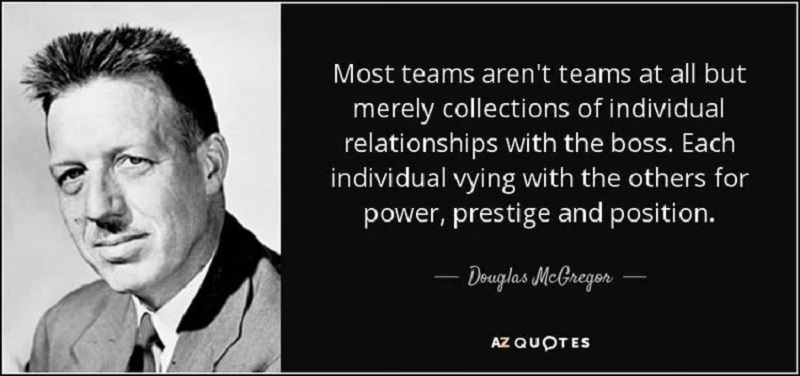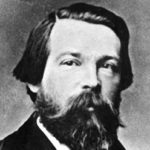Douglas McGregor biografie, quotes en theorie

Douglas McGregor (1906 -1964) was een beroemde management professor op het gebied van persoonlijke ontwikkeling en motivatietheorie. Douglas McGregor is vooral bekend vanwege zijn ontwikkeling van X en Y theorie, een leiderschapstheorie over twee verschillende leiderschapsstijlen.
Douglas McGregor biografie
Douglas McGregor heeft zijn Bachelor (B.E.) behaald in Werktuigbouwkunde aan het Rangoon Institute of Technology (RIT) in Birma. In 1932 behaalde Douglas McGregor zijn Bachelor (B.A.) in Bedrijfskunde aan de Wayne State University. Toch was hij nog niet klaar met studeren.
Hij had een bijzondere interesse in psychologie en ging naar de Harvard University. Eerst behaalde hij in 1935 zijn master (M.A.) en ontving in 1935 zijn PhD graad in sociale psychologie.
Na zijn promotie bleef Douglas McGregor actief in de academische wereld. Hij vervolgde zijn academische carrière door te doceren aan de Harvard University en MIT Sloan School of Management.
Hij was zeer geïnteresseerd in wetenschappelijk management en modern management, met name de leiderschapsstijlen en de invloed en effecten. Dit is waar de eerste ideeën ontstonden over de X en Y theorie.
Verdere studie en empirisch onderzoek resulteerde in een van zijn bestsellerboeken: The Human Side of Enterprise (1960). De inhoud van het boek gaat over individuele managementaannames, in relatie tot de menselijke aard en de manier waarop een manager zijn of haar werknemers managet.
Tijdens zijn carrière publiceerde Douglas McGregor niet veel. Maar als hij publiceerde, dan had het grote invloed, zoals bijvoorbeeld ook bij Henri Fayol. Vlak voordat hij stierf (plotseling vanwege een hartaanval), schreef hij artikelen over de nieuwe Theorie Z.
Deze theorie Z was een antwoord op de critici van de X en Y theorie.
Samen met William Ouchi ontwikkelde hij Theorie Z, die gaat over het bevorderen van een stabiele werkomgeving, een hoog gevoel van productiviteit en een hoge moraliteit en tevredenheid van de werknemers.
Bekende quotes
- “The ingenuity of the average worker is sufficient to outwit any system of controls devised by management.”
- “An objective without a plan is a dream.”
- “Most teams aren’t teams at all but merely collections of individual relationships with the boss. Each individual vying with the others for power, prestige and position.”
- “Man is a wanting animal – as soon as one of his needs is satisfied, another appears in its place. This process is unending. It continues from birth to death.”
- “Trust means “I know that you will not-deliberately or accidentally, consciously or unconsciously-take unfair advantage of me.” It means “I can put my situation at the moment, my status and self-esteem in the group, our relationship, my job, my career, even my life in your hands with complete confidence.”
- “Relationships is a growing part of life; not life growing apart.”
- “Our goal should be minimum standardization of human behavior.”
- “Then it becomes necessary to get the field organization to accept the help provided. This is normally the role of the Change Manager; to implement the change that no-one asked for or wants.”
- “Management cannot provide a man with self-respect or with the respect of his fellows or with the satisfaction of needs for self-fulfilment. It can create conditions such that he is encouraged and enabled to seek such satisfactions for himself, or it can thwart him by failing to create those conditions.”
Publicaties en boeken van Douglas McGregor et al.
- 2006, 1979, 1960. The human side of enterprise. McGraw Hill Professional.
- 1976. An analysis of leadership. Leadership and social change, 16-24.
- 1972. An uneasy look at performance appraisal. Reprint Service, Harvard Business Review.
- 1969. Theory Y: The integration of individual and organizational goals. People and productivity, 194.
- 1967. The professional manager. McGraw Hill Professional.
- 1967. Do Management Control Systems Achieve Their Purpose?. Management Review, 56(2), 4-18.
- 1966. The human side of enterprise. Classics of Organization Theory, 179-183.
- 1961. New concepts of management. Technology Review.
- 1957. An uneasy look at performance appraisal. Soldiers Field.
- 1948. The staff function in human relations. Journal of Social Issues, 4(3), 5-22.
- 1947. Union-management cooperation: a psychological analysis. Mass. Inst. of Technology.
- 1944. Conditions of effective leadership in the industrial organization. Journal of Consulting Psychology, 8(2), 55.
- 1944. Getting effective leadership in the industrial organization. Massachusetts Institute of Technology, Department of Economics and Social Science.
- 1938. The major determinants of the prediction of social events. The Journal of Abnormal and Social Psychology, 33(2), 179.
- 1935. Scientific measurement and psychology. Psychological Review, 42(3), 246.
Citatie voor dit artikel:
Van Vliet, V. (2016). Douglas McGregor. Retrieved [insert date] from Toolshero: https://www.toolshero.nl/bekende-auteurs/douglas-mcgregor/
Oorspronkelijke publicatiedatum: 19/06/2016 | Laatste update: 09/12/2023
Wilt u linken naar dit artikel, dat kan!
<a href=”https://www.toolshero.nl/bekende-auteurs/douglas-mcgregor/”>Toolshero: Douglas McGregor</a>












